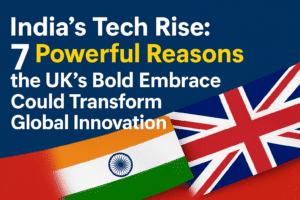India’s Tech Rise: 7 Powerful Reasons the UK’s Bold Embrace Could Transform Global Innovation
The UK’s explicit recognition of India as a “dominant force” in global science and technology, voiced by Minister Vallance, signals a profound strategic shift. It moves beyond diplomacy, acknowledging India’s genuine R&D leadership far beyond cost advantages, evidenced by its space program, deep-tech startups, and digital infrastructure.
Crucially, the UK links this to its own competitiveness, pushing for enhanced talent mobility via visas and embedding future collaboration within its upcoming Industrial Strategy. The pending UK-India Free Trade Agreement is positioned as a key catalyst, aiming to transform shared ambitions in fields like health innovation (highlighted by Lord Darzi) and cleantech (showcased by startups like Zypp) into concrete joint projects. This partnership underscores a critical global trend: solving complex challenges demands leveraging diverse talent pools and moving towards a multipolar innovation landscape where collaboration, not isolation, drives progress.

The recent India Global Forum in London wasn’t just another diplomatic meeting; it served as a powerful signal that the global innovation map is being redrawn. When Britain’s Minister for Science, Research and Innovation, Sir Patrick Vallance, explicitly declared India a “dominant force” in global science and technology, it wasn’t mere flattery. It was a strategic acknowledgement with profound implications for both nations and the future of innovation.
More Than Words: The Substance Behind the Praise
Vallance’s statement transcends a simple compliment. It reflects a tangible shift in perception driven by observable realities:
- India’s Accelerating Innovation Engine: From leading global IT services and a booming space program (Chandrayaan-3!) to becoming a hotbed for deep-tech startups (AI, biotech, cleantech) and ambitious digital public infrastructure (UPI, Aadhaar), India’s capabilities are demonstrably expanding beyond cost advantage to genuine R&D leadership.
- The Urgency for the UK: Vallance didn’t just praise; he prescribed action. His call to “leverage” scientific and academic ties underscores a UK need: to access India’s vast talent pool, burgeoning market, and unique problem-solving approaches, especially post-Brexit. The emphasis on the Global Talent Visa is crucial – it’s a recognition that attracting and retaining Indian scientists, engineers, and entrepreneurs is vital for UK competitiveness.
- Frameworks for the Future: The announcement that the upcoming UK Industrial Strategy will explicitly include a framework for bilateral innovation with India is significant. This moves collaboration beyond ad-hoc projects towards structured, long-term partnerships. It signals intent to embed India deeply into the UK’s own economic and technological roadmap.
The Mutual Catalyst: The FTA and Shared Ambitions
Union Minister Piyush Goyal rightly highlighted the Free Trade Agreement (FTA) as more than just a tariff-reduction tool. In this context, it’s a potential catalyst for S&T collaboration. A well-negotiated FTA could:
- Simplify Research Collaboration: Ease joint research initiatives, data sharing, and co-development of technologies.
- Protect IP Effectively: Provide the confidence needed for deep R&D partnerships.
- Facilitate Commercialization: Smooth the path for bringing co-created innovations to market in both countries. Goyal’s push to translate “mutual focus areas” into “tangible joint opportunities” is the critical next step. It demands moving beyond shared interests to concrete projects – joint research centers, co-funded challenges (e.g., in net-zero tech or AI ethics), and industry consortia.
Beyond IT: The Health Innovation Imperative
Lord Ara Darzi’s focus on health innovation adds a vital dimension. India’s combination of scale, cost-effective engineering, digital penetration, and a growing biopharma sector offers unique solutions to global health challenges. Closer UK-India collaboration here could accelerate affordable diagnostics, telemedicine platforms, AI-driven drug discovery, and pandemic preparedness – areas where both nations have strong capabilities and shared interests. Darzi’s NHS experience lends weight to this call.
The Proof is in the Showcase: Startups Leading the Charge
The forum featuring startups like Zypp Electric (winner of the Clean Tech Award) wasn’t just window dressing. It exemplified the vibrant, practical innovation emerging from India. These companies represent the tangible outcomes of India’s tech ecosystem – solving real-world problems (like sustainable mobility) and ready for global partnerships and scaling. They are the living proof of Vallance’s assertion.
Why This Matters for the Global Reader:
This isn’t just a bilateral story. It signals:
- A Multipolar Innovation Landscape: The West no longer holds a monopoly on cutting-edge science and tech. Major economies must engage seriously with emerging powerhouses like India.
- Talent Mobility is Key: Nations that successfully attract and integrate global talent, like the UK aims to do via its visa focus, will lead. Brain circulation benefits everyone.
- Collaboration is the New Competition: Solving complex global challenges (climate, health, food security) requires pooling resources, knowledge, and diverse perspectives. The UK-India push, if realized, could be a model.
- Strategic Alignment is Critical: Vallance linking India directly to the UK’s Industrial Strategy shows a level of strategic prioritization that other nations should note.
The Path Forward: From Rhetoric to Reality
The London forum provided a compelling vision. The challenge now lies in execution:
- Delivering the Visa Reforms: Making the Global Talent Visa truly accessible and attractive for Indian talent.
- Crafting a Meaningful Industrial Strategy Framework: Ensuring it provides clear pathways and incentives for deep UK-India R&D and commercialization partnerships.
- Finalizing an Innovation-Forward FTA: Embedding provisions that actively foster S&T collaboration, not just trade.
- Building Trust and Simplifying Processes: Overcoming bureaucratic hurdles and fostering genuine people-to-people links between research institutions and industries.
Sir Patrick Vallance’s recognition of India’s S&T dominance marks a significant moment. It reflects a new reality and presents a compelling opportunity. If both nations translate this powerful rhetoric into concrete, sustained action, their partnership could become a defining engine for global innovation in the decades to come. The world will be watching.
You must be logged in to post a comment.